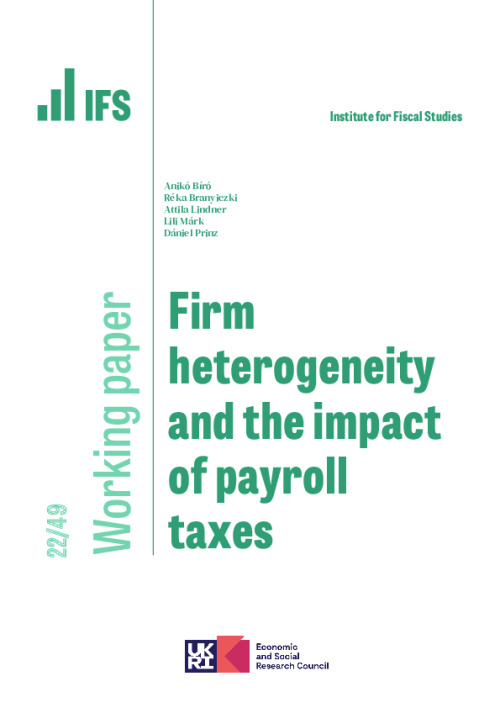Downloads
We study the impact of a large payroll tax cut for older workers in Hungary. Motivated by the predictions of a standard equilibrium job search model, we examine the heterogeneous impact of the policy. Employment increases most at low-productivity firms offering low-wage jobs, which tend to hire from unemployment, while the effects are more muted for high-productivity firms offering high-wage jobs. At the same time, wages only increase at high-productivity firms. These results point to important heterogeneity in the incidence of payroll tax cuts across firms and highlight that payroll taxes have a significant impact on the composition of jobs in the labor market.
Authors

Research Associate
Anikó is a Research Associate at the IFS and a senior researcher at the Institute of Economics, Centre for Economic and Regional Studies in Budapest.
Réka Branyiczki

Research Fellow University College London
Attila is an IFS Research Fellow, an Associate Professor of Economics at the University College London and Adjust Professor at the University of Oslo.
Lili Márk

Research Associate World Bank
Daniel is an economist at the World Bank. His research covers topics in public finance, including social insurance, taxation, and inequality.
Working Paper details
- DOI
- 10.1920/wp.ifs.2022.4922
- Publisher
- Institute for Fiscal Studies
Suggested citation
Branyiczki, R et al. (2022). Firm heterogeneity and the impact of payroll taxes. 22/49. London: Institute for Fiscal Studies. Available at: https://ifs.org.uk/publications/firm-heterogeneity-and-impact-payroll-taxes (accessed: 30 June 2024).
More from IFS
Understand this issue

Election Special: Your questions answered
27 June 2024

Election Special: The big issues politicians haven't spoken about
25 June 2024

Election Special: The Labour manifesto explained
14 June 2024
Policy analysis

How do the last five years measure up on levelling up?
19 June 2024

How would the parties’ tax and spending plans affect Scotland and Wales?
28 June 2024

What are the parties’ plans for benefits and taxes?
24 June 2024
Academic research

The impact of labour demand shocks when occupational labour supplies are heterogeneous
28 June 2024

Labour market inequality and the changing life cycle profile of male and female wages
15 April 2024

Interpreting cohort profiles of lifecycle earnings volatility
15 April 2024
